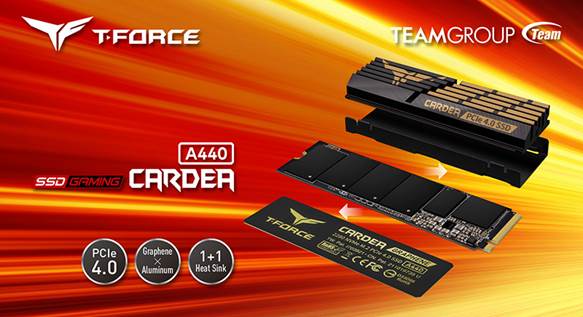
TEAMGROUP challenges the SSD industry’s highest speeds today with its launch of the CARDEA A440 PCIe 4.0 SSD under its gaming sub-brand T-FORCE. It features extreme read and write speeds up to 7000 MB/s and 6900 MB/s, respectively, and comes with two patented heat sinks that gamers can install and match to their needs. The SSD’s blazing speeds will help players unleash their skills and venture into gaming worlds faster than ever.

The T-FORCE CARDEA A440 PCIe 4.0 SSD supports the PCIe Gen 4×4 specification and the latest NVMe 1.4 standard and is backward compatible with PCIe 3.0 interface ports. Not only does it support high read/write speeds of up to 7000/6900 MB/s, but it is also available with large capacities of 1 or 2 TBs. The classic matte black CARDEA A440 features two of the industry’s first interchangeable, patent-certified thermal modules. The layered and unique beveled surface of the “aluminum fins” is specially designed to increase the heat dissipation area and can reduce SSD temperature by up to 15%[1]. The “ultra-thin graphene heat sinks” consisting of the best materials for thermal conductivity and can dissipate heat by up to 9%[2]. TEAMGROUP’s CARDEA A440 provides the best heat dissipation solution. Gamers no longer need to worry about encountering thermal throttling when running games at full speed, causing slowdowns. They can freely enjoy the ultimate gaming experience.
The T-FORCE CARDEA A440 SSD uses the latest RRL (Read Recovery Level) technology, which can improve the SSD’s lifespan. Its optimized NVM Sets segmentation mechanism and PLM (Predictable Latency Mode) reduces latency and read and write wear. The CARDEA A440 SSD not only features remarkable specifications but also heat dissipation technology and excellent durability, providing the most stable experience for users and helping them realize their full gaming potential.
FEATURES of CARDEA A440 PCIe 4.0 SSD
- Enjoy the lightning speed of the PCIe Gen4 x4
- Featuring two patented heat sinks
- Effective cooling—flexible installation
- Supports the latest NVMe 1.4 standard
- Taiwan Utility Patent (number: M541645)
- Taiwan Invention Patent (number: I703921)
- China Utility Patent (number: CN 211019739 U)
Product Specifications
| Model | CARDEA A440 | |
| Interface | PCIe Gen4.0 x4 with NVMe 1.4 | |
| Capacity | 1TB / 2TB[4] | |
| Voltage | DC +3.3V | |
| Operation Temperature | 0˚C ~ 70˚C | |
| Storage Temperature | -40˚C ~ 85˚C | |
| Terabyte Written | 1TB / >700TB 2TB / >1,400TB[5] | |
| Performance | Crystal Disk Mark: 1TB Read/Write: up to 7,000/5,500 MB/s 2TB Read/Write: up to 7,000/6,900 MB/s[1] | IOPS (IOMeter): 1TB Read/Write: up to 650K/700K 2TB Read/Write: up to 650K/700K[1] |
| Weight | 13g (with Graphene heat sink) 46g (with Aluminum heat sink) | |
| Dimensions | 80.0(L) x 22.0(W) x 3.7(H) mm (with Graphene heat sink) 80.0(L) x 23.4(W) x 12.9(H) mm (with Aluminum heat sink) | |
| Humidity | RH 90% under 40°C (operational) | |
| Vibration | 80Hz~2,000Hz/20G | |
| Shock | 1,500G/0.5ms | |
| MTBF | 3,000,000 hours | |
| Operating System | System Requirements:Windows 10 / 8.1 / 8 / 7 / Vista[6]Linux 2.6.33 or later | |
| Warranty | 5-year limited warrant[7] |
[1] This product is compatible with Intel and AMD platforms, and the performance result is tested on a motherboard that supports PCIe 4.0 interface by the T-FORCE internal laboratory. The actual speed may vary depending on the software and hardware conditions of the platform.
[2] With TEAMGROUP’s patented gaming fin type cooling module, both natural convection or forced air cooling (e.g. fan) can enhance heat dissipation. Long and rigorous test and burn-in test by the internal laboratory have proven that it can lower the temperature by up to 30℃ in open space and 10℃ in closed space, which provides more stable performance and extends the service life of the SSD.
[3] The experimental data is based on T-FORCE internal laboratory’s test result. Under the same condition, the temperature test data is according to the comparison of the non-heat spreader M.2 PCIe Gen4 x4 SSD and the T-FORCE CARDEA A440 Solid State Drive. The relevant test environment is simulated under a fanless environment using mask. The actual speed may vary depending on the software and hardware conditions of the platform.
[4] 1GB=1,000,000,000 Bytes. In OS system, it would be displayed as 1,000,000,000 Bytes/1024/1024/1024 = 0.93GB
[5] Definition and conditions of TBW (Terabytes Written)are based on JEDEC standard
[6] PCIe SSD works best under WIN8.1 and WIN10 operating system. Windows Operating Systems earlier than Windows 8.1 does not support NVMe Driver natively. Users will need to install NVMe Driver prior installing the SSD.
[7] The SSD is based on the TBW or Warranty period.
About TEAMGROUP
As a leading provider of memory storage products and mobile applications to the consumer market, Team Group Inc. is committed to providing the best storage, multimedia, and data sharing solutions. All TEAMGROUP’s memory module products come with a lifetime warranty, repair, and replacement services. Team Group Inc., also listed company at stock exchange market in January 2019. In 2016, TEAMGROUP established the T-FORCE gaming series which includes all the gaming memory modules. In 2020, TEAMGROUP established the T-CREATE brand for creative users. For more information, please visit the TEAMGROUP website at www.teamgroupinc.com or follow our social media including Facebook: www.facebook.com/teamgroupinc /Twitter: https://twitter.com/teamgroupinc Instagram: https://www.instagram.com/teamgroupinc



Leave a Reply